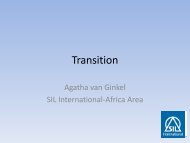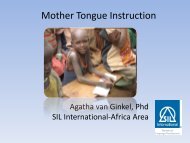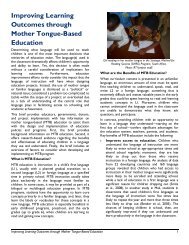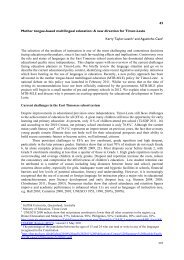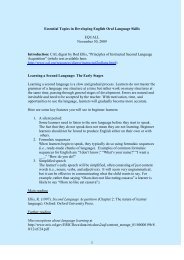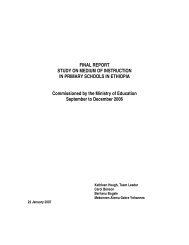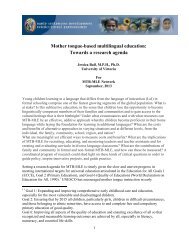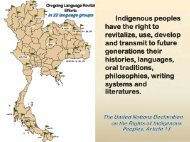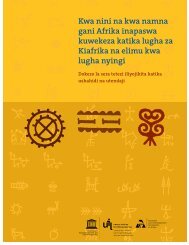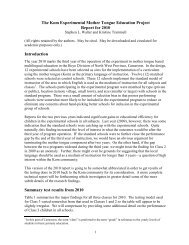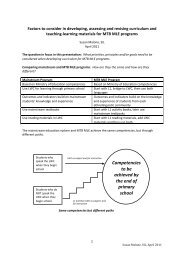PhilippinesThe Bilingual Education Act originally focused on English and Filipino. 1 However, it has beenrecognized that there should be a policy for implementing mother-tongue education, and the Bureauof Non-Formal Education (BNFE) has initiated a series of workshops with different partners, includingthe Institute of National Languages.The 1987 Bilingual Education policy of the Department of Education, Culture and Sports focuseson the attainment of competence in both the international and national languages of education: Englishand Filipino. The mother tongue can be used as an auxiliary language for Grades 1 and 2, and asthe language for literacy instruction where needed. In 1999, legislation specified that instructionin Grade 1 could be in the mother tongue, with English taught orally in the second semester ofGrades 1 and 2. The vernacular could also be used as the medium of instruction in literacy. Thisfacilitates the preservation of the mother tongue, and gives greater access to content subjects forlearners.It is important that local people should be the facilitators of community-based education programmes.Since 1987, there have been challenges in implementing this, including the process of trainingfacilitators. Therefore, there has been major training for staff at all levels, from training trainers atthe national level who, in turn, trained their counterparts at lower levels. It has been difficult todevelop new materials in local languages, and so materials have been translated, which has beencostly. Awareness raising, social mobilization and lobbying of local government groups was alsoneeded because some did not value local language instruction. It should be noted that private schoolsare not required to follow the bilingual education policy, and many have English as the medium ofinstruction.The Bureau of Non-Formal Education coordinates with NGO’s and the National Commission forIndigenous Peoples to financially support multilingual education. This is especially important asNFE gets very little governmental financing. The BNFE has begun to translate materials into the7 major languages of the country. The Government has also begun to develop primary school materialsin the 4 major “lingua franca” of the country. The international NGO, SIL, in cooperation withlocal communities, has developed materials in more than 70 languages.ThailandIn Thailand, there are over 60 ethnic minorities including the hilltribes. There is no specific policyor strategy for multilingual education. However, the Constitution and the National Education Actinclude provisions for multilingual communities. Educational decentralization, which is beingimplemented throughout the country, emphasises responsiveness to the local community in education,as well as the recognition of “local wisdom” and indigenous knowledge. There is, indeed, evidenceof greater openness towards multilingual education.In such a situation where a specific language-in-education policy is lacking, there needs to becontinuing capacity-building and support for teachers wanting to use local language in education.1The national language is Filipino. Tagalog is one of the languages of wider communication. Filipino is based on Tagalog.64
There is a desire to replicate and expand the current Thai (Pwo Karen) project being conductedwith the support of UNESCO-APPEAL. Initially, the project will be expanded in a focusedgeographical area, rather than diluting human resources over too broad a geographical spread. Incooperation with Thai universities, national, and international organizations, there is a desire toextend research on multilingual education to other ethnic groups within the country. This researchhas the potential to influence both the Ministry of Education and education law by documentingproject successes.Viet NamIn Viet Nam, the Kinh majority numbers 88%, withethnic minorities numbering 12% of the population.The national education policy promotes theattendance of ethnic minorities in primary andsecondary school. Since the 1960s, the primaryeducation law supports equity of educationalopportunity for ethnic minority peoples.There is an Ethnic Minority Department at theMinistry of Education that focuses on thedevelopment of ethnic minority education. InViet Nam’s central university, there is a departmentworking on writing systems. Currently, twentyethnic minorities have their own scripts. At thenational level, the Ministry of Culture andInformation also has an agency for ethnicminorities.Discussion on Policy and SustainabilityResearchGovernments often do not like to take risks, and may not like pilot projects. Thus, it is importantto document experiences which can then impact governments and key decision-makers at the nationallevel. Politicians and government agencies generally look for research outcomes and objectivedata. It could be important for UNESCO-APPEAL to support a research component in several ofthe countries implementing multilingual education projects for minority peoples in order to providesupportive data on the effectiveness of multilingual education. UNESCO recognises that these pilotprojects can demonstrate the importance of mother-tongue education to the respective authorities.In reality, very few of the ten countries involved have actively implemented policies on multilingualeducation for minority language communities. Originally, the UNESCO-APPEAL project title was“Research on Mother-Tongue Education for Ethnic Minority Communities.” Only Thailand hasbecome involved in rigorous research since the beginning of the project. UNESCO encouragedthe new countries to document their whole process of programme development and implementation.65
- Page 3 and 4:
Asia-Pacific Programme of Education
- Page 5 and 6:
FOREWORDSome 6,000-7,000 languages
- Page 7 and 8:
Part IOutcomes of the Workshop
- Page 9 and 10:
used as the medium of educational i
- Page 11 and 12:
Viet NamApproximately 100 languages
- Page 13 and 14:
Regionally, there is an increased i
- Page 15 and 16: stakeholders - will share the respo
- Page 17 and 18: materials for children. The researc
- Page 19 and 20: non-formal bilingual education prog
- Page 21 and 22: materials for minority language gro
- Page 23 and 24: NepalNepal is a land-locked country
- Page 25 and 26: UNESCO-APPEAL, the Office of Non-fo
- Page 27 and 28: CHAPTER 3Community Mobilization and
- Page 29 and 30: Case Study: Cambodia - Community Mo
- Page 31 and 32: at a community/village forum. Initi
- Page 33 and 34: CHAPTER 4Developing Minority Langua
- Page 35 and 36: It is important that the principles
- Page 37 and 38: ThailandStages in the development o
- Page 39 and 40: Literature to help people move from
- Page 41 and 42: • adapt majority language materia
- Page 43 and 44: of books. There are teacher instruc
- Page 45 and 46: to local pronunciation. During test
- Page 47 and 48: Reflections on Field VisitSocio-eco
- Page 49 and 50: Topic (includesubtopics)Issues Guid
- Page 51 and 52: CHAPTER 7Training for Facilitators
- Page 53 and 54: Training of FacilitatorsWhen?What?T
- Page 55 and 56: E. Developed Hilltribes Curriculum
- Page 57 and 58: CHAPTER 8Strategies and Tools for E
- Page 59 and 60: Four Types of Evaluation in Literac
- Page 61 and 62: • Constructive• Achievable and
- Page 63 and 64: CHAPTER 9Strategies for Government
- Page 65: a linguistically diverse country. T
- Page 69 and 70: egional languages of education, and
- Page 71 and 72: RESOURCE PAPERSEducation for Multil
- Page 73 and 74: Lack of skills necessary for paid e
- Page 75 and 76: in its third year, was planned spec
- Page 77 and 78: Stage 4 - Ongoing education. At thi
- Page 79 and 80: “The minority languages lack grad
- Page 81 and 82: • Provide funding or identify and
- Page 83 and 84: Easton, C. (2003) Designing orthogr
- Page 85 and 86: Benson, 2003) have come to the same
- Page 87 and 88: The Role of Language in Learning:Wh
- Page 89 and 90: eading skills in the mother tongue
- Page 91 and 92: familiar, because they have learned
- Page 93 and 94: ConclusionsThe findings of the stud
- Page 95 and 96: Moll, L. (1992) Bilingual classroom
- Page 97 and 98: It is often argued that providing e
- Page 99 and 100: crucial in language development, cu



